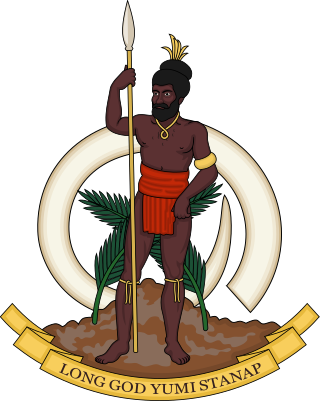
The politics of Vanuatu take place within the framework of a constitutional democracy. The constitution provides for a representative parliamentary system. The head of the Republic is an elected President. The Prime Minister of Vanuatu is the head of government.
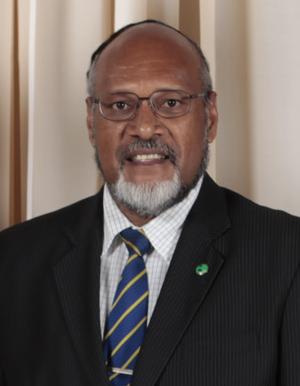
Edward Nipake Natapei Tuta Fanua`araki was a Vanuatuan politician. He was the prime minister of Vanuatu on two occasions, and was previously the minister of Foreign Affairs briefly in 1991, the acting president of Vanuatu from 2 March 1999 to 24 March 1999 and the deputy prime minister. He was the president of the Vanua'aku Pati, a socialist, Anglophone political party.
Alfred Maseng Nalo was a Vanuatuan politician. He served as speaker of the Parliament from December 1991 to November 1995, and foreign minister from 1995 until 1996. He was also the president of Vanuatu for two brief periods lasting about a month each, during 1994 and 2004.

Rialuth Serge Vohor is a Vanuatuan politician. He hails from the largest island of Vanuatu, Espiritu Santo, from Port Olry.
Josias Moli is a Vanuatuan politician who served as speaker of the Parliament of Vanuatu and acting president of Vanuatu.

Moana Carcasses Kalosil is a Vanuatuan politician. He was Prime Minister of Vanuatu from March 2013 to May 2014. He was the first naturalized citizen of Vanuatu to become the country's prime minister.

Kalkot Mataskelekele Mauliliu is a Vanuatuan politician who served as the president of Vanuatu from 16 August 2004 to 16 August 2009.
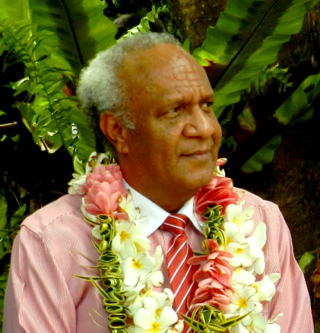
Meltek Sato Kilman Livtuvanu is a Vanuatuan politician who served as the Prime Minister of Vanuatu on four previous occasions, most recently from 4 September to 6 October 2023. he was previously prime minister from December 2010 to April 2011, from May to June 2011 and June 2015 to February 2016, though his premiership was subsequently annulled by a court of law.
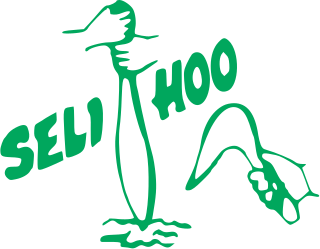
The Vanua'aku Pati is a democratic socialist political party in Vanuatu.
Maxime Carlot Korman is a Vanuatuan politician, formerly serving as the speaker of the Parliament and formerly as acting president. He served as the prime minister of Vanuatu for nearly five years, first from 16 December 1991 to 21 December 1995 and again from 23 February 1996 to 30 September 1996. He was a member of the Union of Moderate Parties during his terms as prime minister, but now leads the Vanuatu Republican Party. He was the first Speaker of Parliament after independence, from July 1980 to November 1983, and also served in that capacity just before independence.

General elections were held in Vanuatu on 2 September 2008. In July the Melanesian Progressive Party requested that they be postponed, contesting the constitutionality of the Peoples Representation Act No. 33 of 2007, which allegedly enabled voters in certain constituencies to vote in two constituencies. The Principal Electoral Officer, Martin Tete, confirmed that the election would take place on 2 September, as scheduled. The day was declared a national holiday, to encourage people to vote.
Sela Molisa was a Vanuatuan politician, who was a member of the Parliament of Vanuatu from 1982 to 2012, and occupied several cabinet posts in the government during his career, including four mandates as the minister of finance.
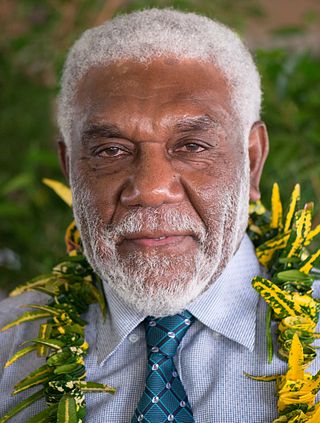
Joe Natuman is a Vanuatuan politician of the Vanua'aku Pati and former Prime Minister of Vanuatu.

The Cabinet of Vanuatu is the cabinet of the government of the Republic of Vanuatu.

Pakoa Maraki Kaltonga, also known as Bakoa Kaltongga, is a ni-Vanuatu politician. He is a member of the Leaders Party of Vanuatu.
Harry Iaris Iauko was a Ni-Vanuatu politician. He was a Member of Parliament for Tanna, representing the Vanua'aku Pati, from 2008 until his death.

An indirect presidential election was held in Vanuatu on 1 September and 2 September 2009. The electors are the 52 MPs and the six heads of provincial governments; ten signatures of support are required for nomination. Outgoing president Kalkot Mataskelekele was renominated for a second term, but Iolu Abil ultimately succeeded in winning a five-year term after three rounds of voting by the electoral college.

The prime minister of Vanuatu is the head of government of the Republic of Vanuatu.
General elections were held in Vanuatu on 30 October 2012. The previous elections to the 52-member Parliament of Vanuatu were held in 2008. The largest parties in this election were the socialist Vanua'aku Party, which won 11 seats, and the social-democratic National United Party. Thirteen other parties as well as four independents won parliamentary seats. As a result, Edward Natapei of the Vanua'aku Party was able to become the Prime Minister. Since then, both Serge Vohor of the conservative Union of Moderate Parties and Sato Kilman of the People's Progressive Party have held that position, with Kilman being the incumbent Prime Minister of Vanuatu at the time of the 2012 election.









